Filter by
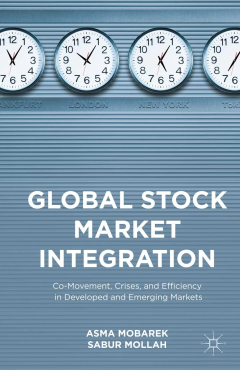
Global Stock Market Integration
Stock market integration between developing and emerging markets has numerous benefits for creating a global - yet stable - world economy. It increases competition and the efficiency of local markets, in turn reducing price volatility and the cost of capital among integrated markets. It also generates capital flows, which enhance financial stability and spur economic growth. At its core, stock …
- Edition
- -
- ISBN/ISSN
- 978-1-349-56205-3
- Collation
- XV, 162
- Series Title
- -
- Call Number
- 330 MOB g

Global Research of Cities
This book, written by the national think tank of China, presents a comprehensive analysis of the key elements and unique characteristics in Chengdu’s development into a global city. To do so, it adopts both external and internal perspectives: externally, it highlights Chengdu’s agglomeration and linkage so as to identify the differences in its overall development in comparison with other wo…
- Edition
- -
- ISBN/ISSN
- 978-981-287-980-6
- Collation
- XVIII, 205
- Series Title
- -
- Call Number
- 330 TAY g

Modern Classical Economics and Reality
This book presents an in-depth, novel, and mathematically rigorous treatment of the modern classical theory of value based on the spectral analysis of the price–profit–wage rate system. The classical theory is also subjected to empirical testing to show its logical consistency and explanatory content with respect to observed phenomena and key economic policy issues related to various multip…
- Edition
- 1
- ISBN/ISSN
- 978-4-431-55003-7
- Collation
- XI, 242
- Series Title
- Evolutionary Economics and Social Complexity Science
- Call Number
- -

Modern Climate Change Science
Composed of two extensive sections, this book surveys important work in climate change science, mainly in the United States, and introduces contributions to the body of science that have arrived on the scene between January 2013 and February 2014. The opening section offers a broad examination of contemporary climate change science, with subsections on the Intergovernmental Panel on Climate …
- Edition
- 1
- ISBN/ISSN
- 978-3-319-09221-8
- Collation
- XXV, 106
- Series Title
- SpringerBriefs in Environmental Science
- Call Number
- -
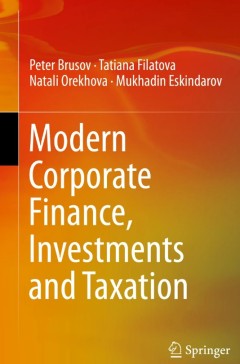
Modern Corporate Finance, Investments and Taxation
This monograph is devoted to the modern theory of capital cost and capital structure and its application to the real economy. In particular, it presents a possible explanation to the causes of global financial crisis. The authors of the book modify the theory of Nobel Prize winners Modigliani and Miller to describe an alternative theory of capital cost and capital structure that can be applied …
- Edition
- 1
- ISBN/ISSN
- 978-3-319-38395-8
- Collation
- XVI, 368
- Series Title
- -
- Call Number
- -
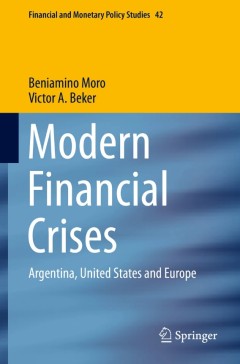
Modern Financial Crises
This book is devoted to the analysis of the three main financial crises that have marked this century: 2001 Argentina’s defaulting on its external debt, the American subprime crisis in 2008, and the current European debt crisis in Europe. The book pursues three major objectives: firstly, to accurately portray these three financial crises; secondly, to analyze what went wrong with mainstream e…
- Edition
- 1
- ISBN/ISSN
- 978-3-319-20990-6
- Collation
- XVII, 257
- Series Title
- Financial and Monetary Policy Studies
- Call Number
- -

Evolution of the Exchange Industry From Dealers’ Clubs to Multinational Co…
This book describes the dramatic changes that have occurred in the exchange industry during the past two decades. The strategies adopted by major world exchanges during this period are explained and the roles of multilateral trading systems and over-the-counter (OTC) players are clearly described, highlighting their economics and their interconnections with traditional exchanges. Up-to-date, co…
- Edition
- -
- ISBN/ISSN
- 978-3-319-21027-8
- Collation
- 3 b/w illustrations, 40 illustrations in colour
- Series Title
- -
- Call Number
- -

Evolution of Cyber Technologies and Operations to 2035
This book explores the future of cyber technologies and cyber operations which will influence advances in social media, cyber security, cyber physical systems, ethics, law, media, economics, infrastructure, military operations and other elements of societal interaction in the upcoming decades. It provides a review of future disruptive technologies and innovations in cyber security. It also serv…
- Edition
- -
- ISBN/ISSN
- 978-3-319-23585-1
- Collation
- 4 b/w illustrations, 7 illustrations in colour
- Series Title
- -
- Call Number
- -
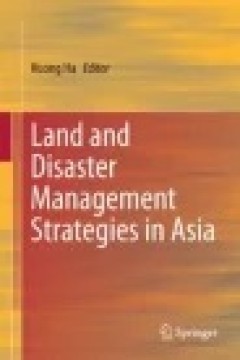
Land and Disaster Management Strategies in Asia
This book focuses on land and disaster governance in Asian countries. The Asian region has become increasingly vulnerable to natural disasters, including floods, cyclones, storms, earthquakes, drought, typhoons and tsunamis. Further, as a result of unsustainable changes being made in patterns of land use, catchment and coastal zones, increasing population density, migration patterns, and the sp…
- Edition
- -
- ISBN/ISSN
- 978-81-322-1976-7
- Collation
- -
- Series Title
- -
- Call Number
- -
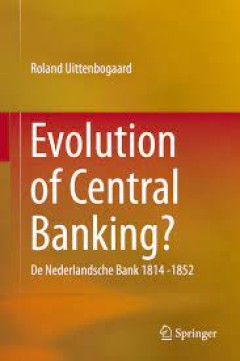
Evolution of Central Banking? De Nederlandsche Bank 1814 -1852
The book analyses the establishment of De Nederlandsche Bank and its early development as a case study to test competing theories on the historical development of central banking. It is shown that the establishment of DNB can be explained by both the fiscal theory and the financial stability theory. Later development makes clear that the financial stability role of DNB prevailed. DNB´s bank no…
- Edition
- -
- ISBN/ISSN
- 978-3-319-10617-5
- Collation
- 14 illustrations in colour
- Series Title
- -
- Call Number
- -
 Computer Science, Information & General Works
Computer Science, Information & General Works  Philosophy & Psychology
Philosophy & Psychology  Religion
Religion  Social Sciences
Social Sciences  Language
Language  Pure Science
Pure Science  Applied Sciences
Applied Sciences  Art & Recreation
Art & Recreation  Literature
Literature  History & Geography
History & Geography